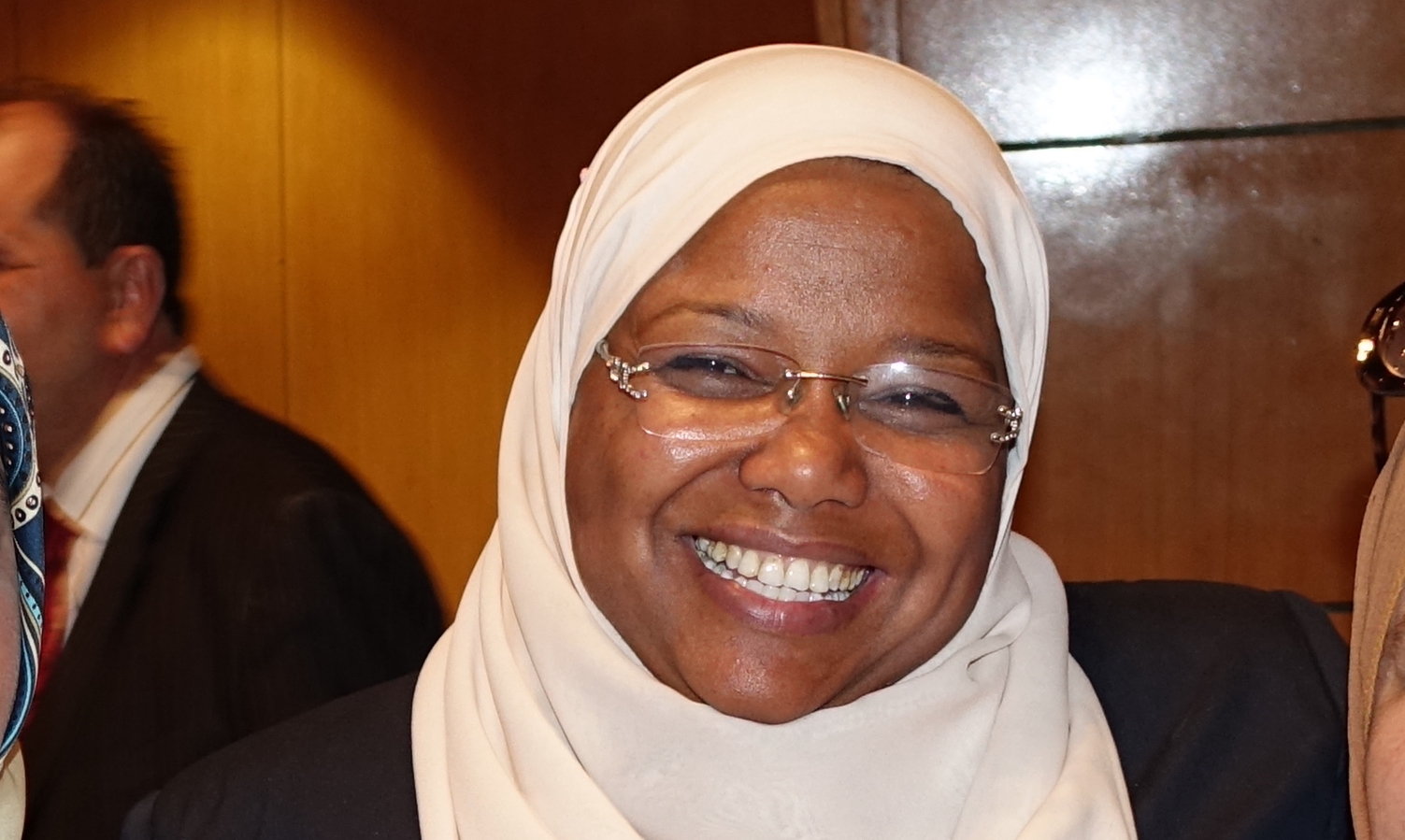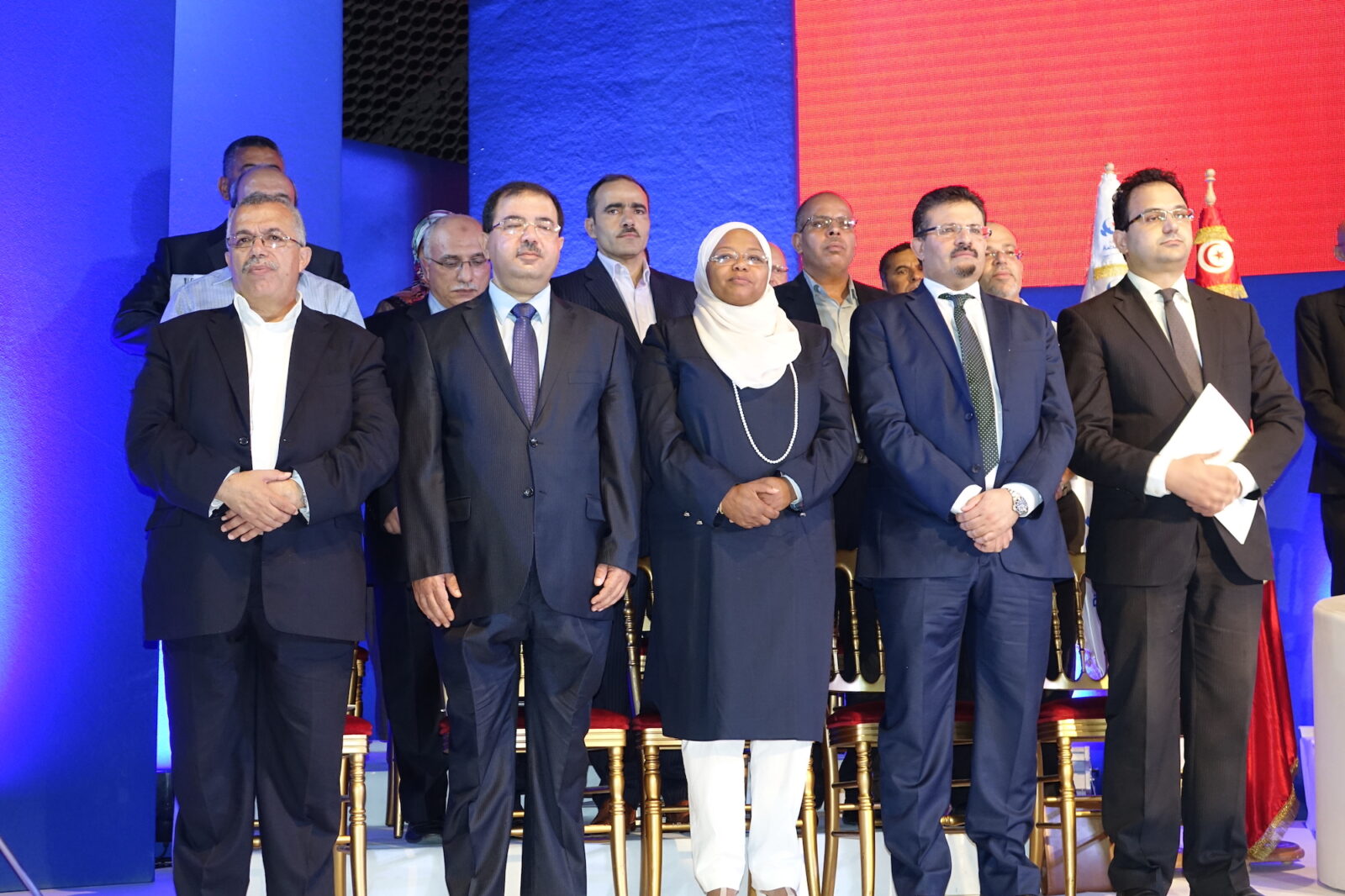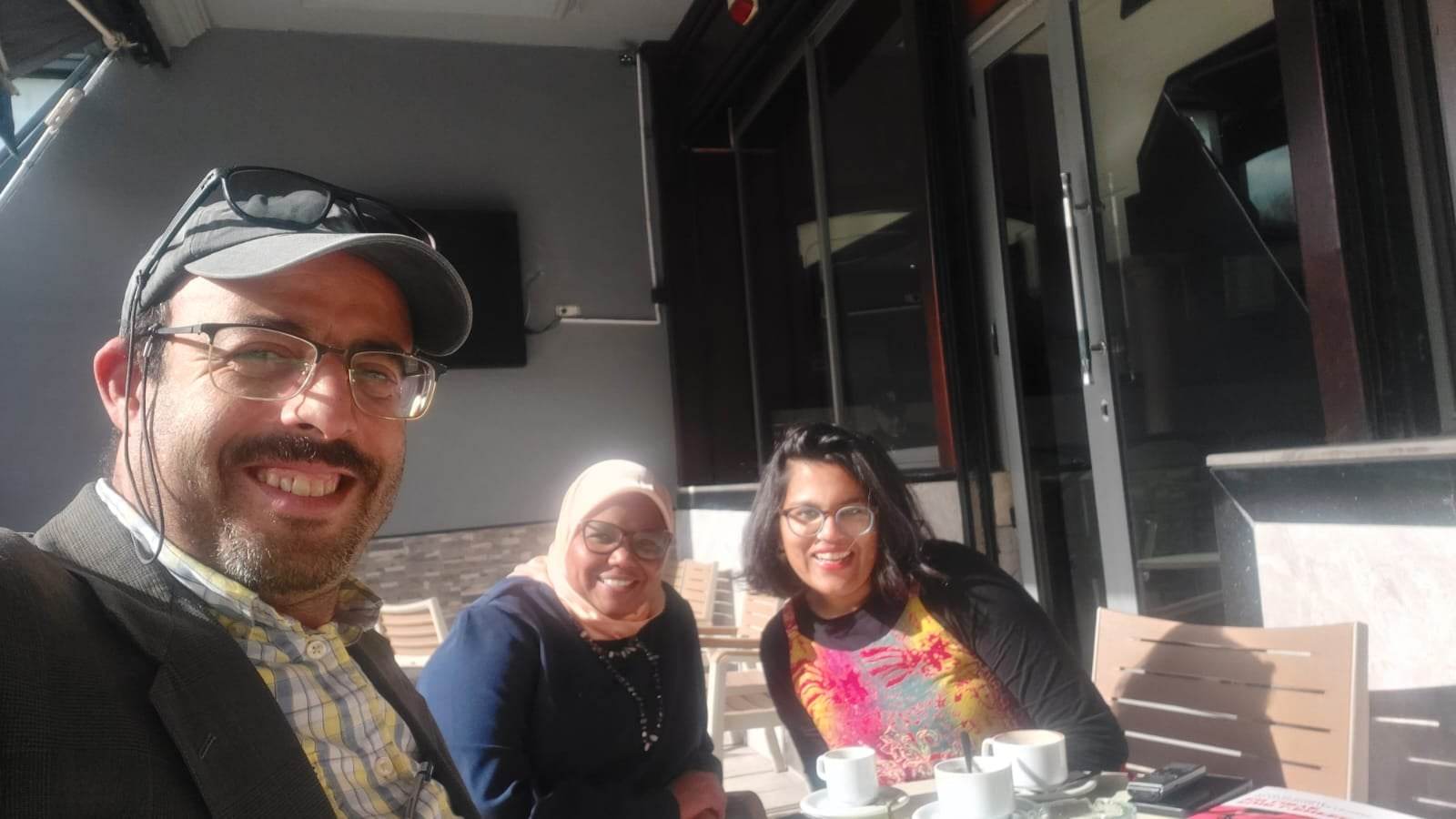Jamila Debbech Ksiksi, Black Tunisian activist and ex-member of parliament, died on December 19, 2022 in a traffic accident on the Tunis-Sfax highway, an accident which also killed her sister, Amel Debbech.

Jamila Debbech Ksiksi, 2014. Photo courtesy of Ennahda party.
Ksiksi was a key figure in the anti-racism movement in Tunisia. In collaboration with Black Tunisian and sub-Saharan civil society members, she helped mobilize against anti-Black racism following the revolution in 2011.
Ksiksi and I met twice in Tunis in November of 2022 to talk about her political activism, past and present. Since we spoke, these interviews have taken on a new gravity, not only due to her untimely departure just a few weeks later but also due to recent events in Tunisia. Tunisian president Kais Saied’s anti-sub-Saharan migrant speech, delivered on February 21, 2023, has led to an escalation of violence against people in Tunisia racialized as “African”—a term used to denote bodies seen as Black, foreign and culturally and economically poor in the Tunisian social imagination. While contesting this state and civilian supported racist language and violence, Black Tunisian civil society members have invoked Law 50, passed in 2018, which criminalizes racial discrimination. As a member of parliament Ksiksi was one of the leading forces in the passage of this landmark law.
Ksiksi was born in 1968 in Médenine, the capital of the governorate of the same name that borders Libya in the south of Tunisia. She undertook her university education in Tunis, first, at the Higher Institute for Management and later, at the Higher Institute for Business Studies of Carthage. Before the revolution in 2011, she was employed as a high-ranking official in the public sector, working for the National Social Security Fund and later for the National Health Insurance Fund. Following the revolution, Ksiksi ran for election as a member of the Ennahda Movement party, and in 2014 she became the first Black Tunisian woman to be elected as a member of parliament. As she mentions in the interview, this win was also a first in the wider Middle East and North Africa region (which Ksiksi characterizes as “white”). During this time, Ksiksi also served as a member of the Pan-African Parliament, the legislative body of the African Union, presiding over its Women’s Caucus. She remained active in politics until President Kais Saied froze and later dissolved the parliament on July 25, 2021.
While serving in parliament, Ksiksi advocated for legal reforms to the Tunisian migration regime that exposes sub-Saharan migrants to legal, social and economic violence. The country’s migration regime is governed by an outdated legal framework dating back to 1968 along with more recent policies signed non-transparently with European Union countries. Today, ad-hoc administrative practices in obtaining visas and residence permits and the impossibility of obtaining necessary documents force sub-Saharan migrants to overstay their visa-limits and become undocumented. As Ksiksi described at our meeting, Saied’s dissolution of the parliament halted her push for necessary reforms to Tunisia’s migration laws. Mahmoud Rassaa—then the Deputy Mayor of Raoued municipality in Tunis—was also present at our meeting. Both Ksiksi and Rassaa had left the Ennahda Movement in June 2022 to join the newly formed Amal wa Enjaz (Work and Achievement) party, a conservative party headed by ex-Ennahda members. The interviews, recorded on November 4 and November 30, 2022, were conducted in French and Tunisian Arabic. They have been translated into English and edited for length and clarity.
Shreya Parikh: What led you to become a member of parliament after the 2011 revolution?
Jamila Ksiksi: I came to politics through activism in civil society. Before joining the workforce, I was part of [Mouvement de] La Tendence Islamique, a student association. Beginning in the 1990s, there was repression of all forms of political and associative activities. After I started working, I joined UGTT (Tunisian General Labor Union) as a trade union member and found refuge in union activities since associations could no longer exist.
I always had the intention of presenting myself as a candidate to the parliament. After the revolution, many political parties asked me to be a candidate for legislative elections. Finally, I chose to be with Ennahda Movement because it represented my values. It was a continuation of my work with Tendence Islamique. I was a candidate with Ennahda Movement in 2014. I was elected a member of the assembly, and I became the first Black woman [to be in parliament] in the whole white Arab world, meaning the Arab-region countries with the exception of Sudan and Mauritania because they are countries which are all-Black. I was re-elected in 2019. At the same time, I was always active in civil society. I defended the cause of anti-racism, the gender question and the question of Africanity. I also worked a lot on parliamentarian transparency and the role of civil society in the legislative process and the functioning of parliament.

Jamila Debbech Ksiksi with some of her colleagues in Ennahda, September 2014. Photo courtesy Ennahda party.
Shreya: Many activists and civil society actors talk about the importance of your role, especially as a politician, in the passage of the landmark Law 50 in 2018 that criminalized racial discrimination. How did this law come about?
Jamila: I joined with civil society [movements to combat racism] starting in late 2012 or early 2013. It was the first time that we were speaking about racism in Tunisia. Before, no one was speaking about this subject! But unfortunately, there was a hate campaign back then: They accused us of dividing Tunisian society, of aborting the revolution, of receiving money from abroad to influence the trajectory of the revolution. We were stigmatized!
It wasn’t easy for us to get [an article criminalizing racial discrimination] in the constitution when the constitution of 2014 was being drafted. So, we decided that we would limit ourselves to the recognition of human rights in the constitution. In the constitution of 2014, a few articles use the word “discrimination,” but that’s it. So, after that, we decided to work on a law that bans racism and racial discrimination.
I was elected to parliament [in 2014], and I used this position to bring the question of racism to higher levels: at the level of the government, at the level of the parliament. Before this, it was a debate among civil society groups but hadn’t been taken up by those making the [political] decisions. All this wasn’t easy. I started by speaking with [Ennahda] members in the parliament, but many would say, “We are all Tunisians, and we are all Muslims and in Islam there is equality!” Many also said that speaking about anti-Black racism risked dividing the society and creating tensions. I said “There are people who are being marginalized and who are suffering violence! So, if you really want social cohesion and cohabitation based on justice and equality, we need to protect the rights of the minorities.” A democracy is established when it succeeds in defending the rights of minorities and representing them. I started to speak with [Tunisian] members of parliament living abroad, who were elected to represent the Tunisian community abroad. I received a lot of support from them because they had lived in Europe and they had themselves faced racism.
Then I decided to speak up publicly about the cases of racial violence. In 2015, there was a wave of racism after a Tunisia-[Equatorial] Guinea football match where the [Black, non-Tunisian] referee was accused of being biased against Tunisians [who lost the match]. The racist commentaries were everywhere, including on Facebook and social media. It was shameful! So, I spoke in front of the parliament and said: “You told me that we aren’t racist and that we are all Muslims! So how do you understand this behavior?” Everyone shared the video of my three-minute speech, even abroad. For the first time in Tunisian history, someone had spoken about racism during a plenary session. Since then, every time there was [racist] violence, I would speak at the parliament and invite journalists.
This process of convincing people took me three years, from 2016 until 2018, when the law [50] was adopted. Civil society continuously supported me. They defended anti-racism. They organized marches. They made protest signs and created Facebook groups and pages. They brought in media and organized conferences, fieldwork and other activities. During this time, I was always with them. They say that it was because of my presence in the parliament that the bill was passed in three years, which is really fast in the context of the total denial of racism in our society. But, in truth, the law was a result of my work as well as the efforts of civil society.
Shreya: In your view, what was the key moment in the making of Law 50?
Jamila: Along with civil society members, EuroMed [Rights] group—a human rights organization—had also drafted a bill [on the criminalization of racial discrimination], presented it to the parliament and gotten the necessary signatures from the parliamentarians. At the same time, in December 2016, there was the case of violence against Congolese students after which then-Prime Minister Youssef Chahed made a speech supporting the bill. Chahed presented the bill as a governmental bill, and a governmental bill has priority over a parliament-supported bill, and so we decided to support the governmental bill. Finally, the law passed a vote on October 9, 2018 after a long fight, and it was published in JORT [Official Journal of the Republic of Tunisia] on October 23, 2018.
Shreya: You’ve mentioned before that during the COVID-19 pandemic, which further marginalized the sub-Saharan community, you worked with various municipalities to organize donations for these migrants. What struck you the most during your work?
Jamila: During the distribution of donations, I spoke a lot with sub-Saharan migrants. I noticed that sub-Saharan migrant women suffer from many problems. These women would tell me that they have three or more children, the oldest six years, and I asked them, “where is their father?” They told me that the father came with them to Tunisia but then left for Europe and that they no longer have any contact with him. These women are responsible for three, sometimes four, children and they have no resources. They cannot work, and even if they find work where are they going to leave their children? It is a terrible situation. There are children above the age of six years who have never been to school.
Back then, I invited the then-minister of education to show him the situation of these migrant children. The problem is that these children don’t even go to kindergarten, and so they do not learn Arabic and they miss the first step of schooling. When the migrant children join the Tunisian public schools, they realize that it is all in Arabic and they cannot follow the classes because their mothers don’t speak Arabic, their fathers don’t speak Arabic, the people in their social environment don’t speak Arabic. The integration of sub-Saharan migrants into Tunisian society is a big challenge, and we are not really aware that there is a whole generation born in Tunisia who are Tunisians because they were born on the Tunisian territory and who are deprived of their rights. They cannot access education and health and other public services.
Shreya: During my interviews with sub-Saharan migrants in Tunisia be they students or workers or of other status, the biggest challenge they mentioned was getting legal documentation or the carte de séjour (residence permit). Most of them apply to get these residence permits, but these requests never materialize. How do you explain this?
Jamila: The migration laws we have in Tunisia date from 1968. Back in 1968, there were only a few elites who would come to study, but today that is not the case. There is no political desire to reform [the migration laws]. The documents needed to get the residence permit are impossible to get, for example, housing and work contracts. Tunisians don’t want to rent houses to migrants. In addition, most people including Tunisians are employed without contracts. Hence, the large majority cannot apply for residence permits. For migrant workers, work contracts must be signed by the ministry [of employment and professional training]. In Tunisia, migrants need to fulfill a legal condition. They need to prove that the work cannot be done by a Tunisian. This legal condition blocks everyone from getting residence permits, including migrants with diplomas.
It is terrible that there are thousands of sub-Saharan migrants who are circulating without [legal documentation]. When I was in the parliament, I opened a file to discuss these issues. There are also migrants who come here for medical procedures and find themselves becoming undocumented. Sometimes, medical procedures require them to stay past the expiration date of their visas, so they find themselves forced to pay the [visa overstay] penalty charges of 20 dinars per week (around $6.50 per week).
Today, migrants have become an integral part of the Tunisian economy. They saved the olive and wheat cultivation. All agricultural cultivation that needs a large labor force was saved by sub-Saharan migrants. The sector of tourism, in restaurants and in cafés, they work everywhere. They work in garages, in domestic work. They are everywhere. But in spite of this, the Tunisian state doesn’t recognize the importance of these migrants to the economy, and it pretends that problems don’t exist.
Shreya: What do you think is the reason for this lack of recognition?
Jamila: I think it is culture.
Mahmoud Rassaa: I think it is political!
Jamila: In 2019, there was a bill on reforms to the refugee law, but it wasn’t transferred to the parliament.
Mahmoud: The bill became a political controversy because people were scared that Tunisia would become a camp for the refugees. It was everywhere in the media and so [the state] stopped the whole procedure.

Mahmoud Rassaa, Jamila Debbech Ksiksi and Shreya Parikh on November 30, 2022, during their interview.
Jamila: At that time, there was a meeting with an Italian minister. He said that a lot of people are coming [to Lampedusa] from Tunisia. The bill was blocked because [many politicians were] fearful of the European Union agenda. This was political. Regarding the migration law, this is a cultural problem because there is a racial element to it. For example, we don’t treat those from Europe the same way we treat those from sub-Saharan countries. The African states do not have the same power as European states. And the status-quo [of not recruiting migrants formally] is favorable for Tunisian employers because they are not obligated to pay social security protections and taxes for them. This migrant labor force is less expensive.
It takes a lot of time to arrive at reforms linked to rights for migrants and refugees. I worked a lot to have a legal text on the reform of migration laws, but unfortunately my mandate [in the parliament] ended. So now I try to mobilize civil society and a few activists along with the sub-Saharan community and organizations working on migration. We wanted to start brainstorming together on the question of legal reforms on migration and present a bill to amend [the current migration law]. We also wanted to bring up the question of asylum because we do not have a law that regulates asylum in Tunisia, but now the whole process is blocked because the parliament is blocked.
At the time of writing, violence against sub-Saharan migrants in Tunisia continues. On April 11, 2023, a camp of sub-Saharan asylum-seekers in front of UNHCR in Tunis was violently dismantled by the Tunisian police force. Around 80 of these migrants were arrested. Most sub-Saharan migrants are trying to flee the country amid escalating state and civilian violence. Many are risking their lives, taking clandestine sea-routes to Italy. Between April 18 and April 28, 210 bodies of drowned sub-Saharan migrants were recovered on the coast of Sfax governorate by Tunisian Coast Guard units. At the same time, the economic crisis that fuels the anti-migrant hatred in the form of ideas that migrants are “taking away Tunisians’ jobs” or “eating away Tunisian food” continues. Italy has pledged financial support to Tunisia with the hope that Tunisia will act as a border control to both Tunisian and sub-Saharan migrants attempting to cross the border by sea without visas. The importance of legal reforms in migration laws that Jamila Ksiksi had set out to achieve has become clear, as has the fact that these reforms will be impossible to achieve if anti-migrant sentiments continue to be politically employed to gain both local and international support in the midst of economic crisis.
[Shreya Parikh is a dual PhD candidate in sociology at CERI-Sciences Po Paris and the University of North Carolina at Chapel Hill.]
